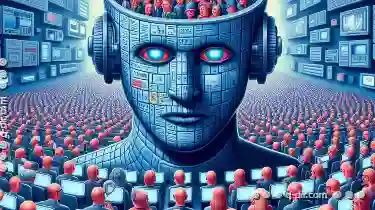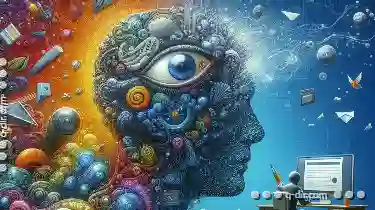This phenomenon is not new; however, it has become a significant force in how we perceive reality, form opinions, and even think about culture and society ...
 as a whole. In this blog post, we will delve into the ways filters have influenced our thinking and behavior, using the theme of "The Cult of the Relevant" as a lens through which to examine this phenomenon. In today's digital age, our lives are increasingly shaped by algorithms that filter information according to our preferences and behaviors.
as a whole. In this blog post, we will delve into the ways filters have influenced our thinking and behavior, using the theme of "The Cult of the Relevant" as a lens through which to examine this phenomenon. In today's digital age, our lives are increasingly shaped by algorithms that filter information according to our preferences and behaviors.1. Understanding Filter Bubbles
2. The Rise of Relevance Cults
3. Strategies for Mitigation
4. Conclusion: Navigating the Information Landscape
1.) Understanding Filter Bubbles
What is a Filter Bubble?
A filter bubble is an algorithmic consequence where digital platforms like social media algorithms or search engines serve content that reinforces one's existing beliefs and minimizes information that challenges them. This is often achieved by analyzing user data and preferences to provide tailored feeds, recommendations, and suggestions.
How Do They Form?
Filter bubbles form because these algorithms are designed to maximize engagement. The more time a user spends on the platform interacting with certain content, the better the algorithm becomes at predicting what that person wants to see next. This leads to an echo chamber effect where opinions are confirmed rather than challenged.
Impact on Society and Individuals
The impact of filter bubbles can be significant:
- Echo Chamber Effect: Users predominantly encounter information that aligns with their views, which can lead to increased polarization of political or ideological beliefs.
- Information Overload: With content tailored specifically for them, users may miss out on broader perspectives and opportunities to learn about different viewpoints.
- Distrust in Information: As the only news cycle one sees is filtered through their device, they might develop a deep mistrust towards mainstream media or any form of information that doesn't fit into their bubble.
2.) The Rise of Relevance Cults
Definition and Characteristics
The relevance cult is an analogy used to describe how users become so deeply entrenched in their filter bubbles that they begin to see everything through the lens of what they believe, ignoring or dismissing evidence that contradicts this belief. This can be seen as a form of cognitive bias where one's perception is influenced by their predisposed beliefs rather than objective reality.
Key Characteristics:
- Selective Perception: Focusing only on information that supports pre-existing views and disregarding contradictory data.
- Confirmation Bias: The tendency to seek, interpret, and remember information in a way that confirms one's preexisting beliefs.
- Defense Mechanisms: When faced with evidence contrary to their beliefs, users often employ various defense mechanisms like denial or minimization to maintain their perspective.
Implications for Democracy and Culture
The rise of relevance cults can have profound implications on democratic processes:
- Erosion of Critical Thinking: As people rely more heavily on curated content, they may become less capable of critical thinking and independent decision-making.
- Manipulation through Propaganda: With algorithms designed to maximize engagement, there's a risk that false or misleading information can spread rapidly, particularly if it taps into users' biases and fears.
3.) Strategies for Mitigation
Encouraging Exposure to Diverse Perspectives
To counteract the effects of filter bubbles:
- Manual Intervention: Users should be encouraged to periodically seek out sources outside their usual bubble to broaden understanding.
- Educational Initiatives: Schools, universities, and media outlets could incorporate courses or segments that focus on global issues and diverse viewpoints.
Enhancing Algorithmic Transparency
Platforms can:
- Provide Transparency Tools: Allow users to see how content is personalized for them and decide whether they want more varied feeds.
- Implement Anti-Bias Algorithms: Working towards algorithms that are designed not just to predict behavior, but also to expose users to views different from their own over time.
4.) Conclusion: Navigating the Information Landscape
The influence of filters on our minds is undeniable and multifaceted. While these tools have revolutionized how we consume information, they also present significant challenges in terms of intellectual diversity and critical thinking. By understanding how filter bubbles work and actively seeking to counteract their effects, individuals can navigate this landscape more effectively and critically engage with the world around them.
In conclusion, while filters have made our digital experiences more personalized and efficient, it's crucial that we remain vigilant against the formation of relevance cults and continue to foster an environment where diverse perspectives are not only welcomed but actively sought after. The future of information consumption should be one where balance is achieved between personalization and exposure to a broader range of ideas.

The Autor: / 0 2025-03-23
Read also!
Page-

Details Power: Instant Information Access
The realm of user interfaces (UI) has evolved significantly over time, with a particular emphasis on enhancing how users can quickly gather and ...read more

Address Bar's "Up to Parent": A Glimpse of Genius or More Clutter?
The humble address bar, a staple in most web browsers, has been around for decades. It serves as the primary means by which users can navigate and ...read more

Is Our Pasting Behavior Environmentally Sustainable?
Our daily interactions with file management systems have become second nature. From transferring files between computers and smartphones to sharing ...read more